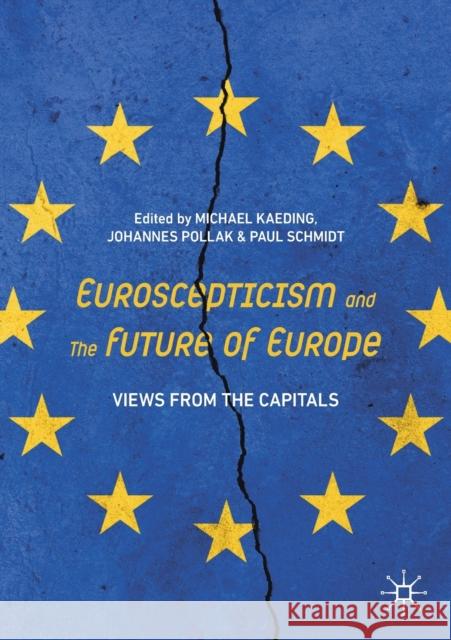Euroscepticism and the Future of Europe: Views from the Capitals » książka



Euroscepticism and the Future of Europe: Views from the Capitals
ISBN-13: 9783030412715 / Angielski / Miękka / 2020 / 174 str.
Euroscepticism and the Future of Europe: Views from the Capitals
ISBN-13: 9783030412715 / Angielski / Miękka / 2020 / 174 str.
(netto: 114,98 VAT: 5%)
Najniższa cena z 30 dni: 107,92
ok. 16-18 dni roboczych.
Darmowa dostawa!
“Euroscepticism remains a significant force to be reckoned with in national and EU-policy making. The present book offers a better understanding of the different types of Euroscepticism that exist across Europe. It also shows that Euroscepticism is best addressed by understanding well the often valid concerns that are at the origins of Eurosceptic forces.”
— Martin Selmayr, Head of the European Commission’s representation in Austria
“This book comes at the right time. European integration seems more contested than ever, but is it really? This book answers this question by probing into 40 shades of Euroscepticism, within and beyond the EU. It is a must read for academics and practitioners alike.”
— Christine Neuhold, University of Maastricht, The Netherlands
“This book offers readers of European politics a treasure trove, with valuable insights into the variety of populist and nationalist forces that oppose mainstream European integration.”
— Andrew Duff, President, The Spinelli Group
This book sheds light on how the increasing prominence of Eurosceptic and nationalist parties is having an impact on the thinking of mainstream parties, their representatives in the European Parliament, and the future of Europe. It provides perspectives on the future of the European project from authors in all the EU Member States, as well as neighbouring European countries and potential applicant nations.
With many Eurosceptic parties now in national government or exerting influence over the national debate, this book maps and analyses the nature and impact of Euroscepticism and nationalism in the different party systems of Europe. As national political parties are the gatekeepers of the process of political representation, they play a pivotal role in mobilizing civil society and in setting the political agenda. They shape politics at a national level, but also determine the way in which Europe plays out—or does not play out—as a political issue. Thus, it is from the national capitals that the very future of Europe emerges.Michael Kaeding is Former Chair and current Honorary Board Member of the Trans European Policy Studies Association. He is Professor of European Integration and EU Politics at the University of Duisburg-Essen, Germany, holding a Jean Monnet Chair.
Johannes Pollak is Rector of and Professor of Political Science at the Webster Vienna Private University, Austria. He is also Senior Research Fellow at the Institute for Advanced Studies, Vienna, and Lecturer at the Universities of Salzburg and Vienna.
Paul Schmidt is Secretary General of the Austrian Society for European Politics in Vienna. He has worked at the Oesterreichische Nationalbank in Vienna and at the Permanent Representation of Austria to the European Union.1997-2026 DolnySlask.com Agencja Internetowa
KrainaKsiazek.PL - Księgarnia Internetowa









